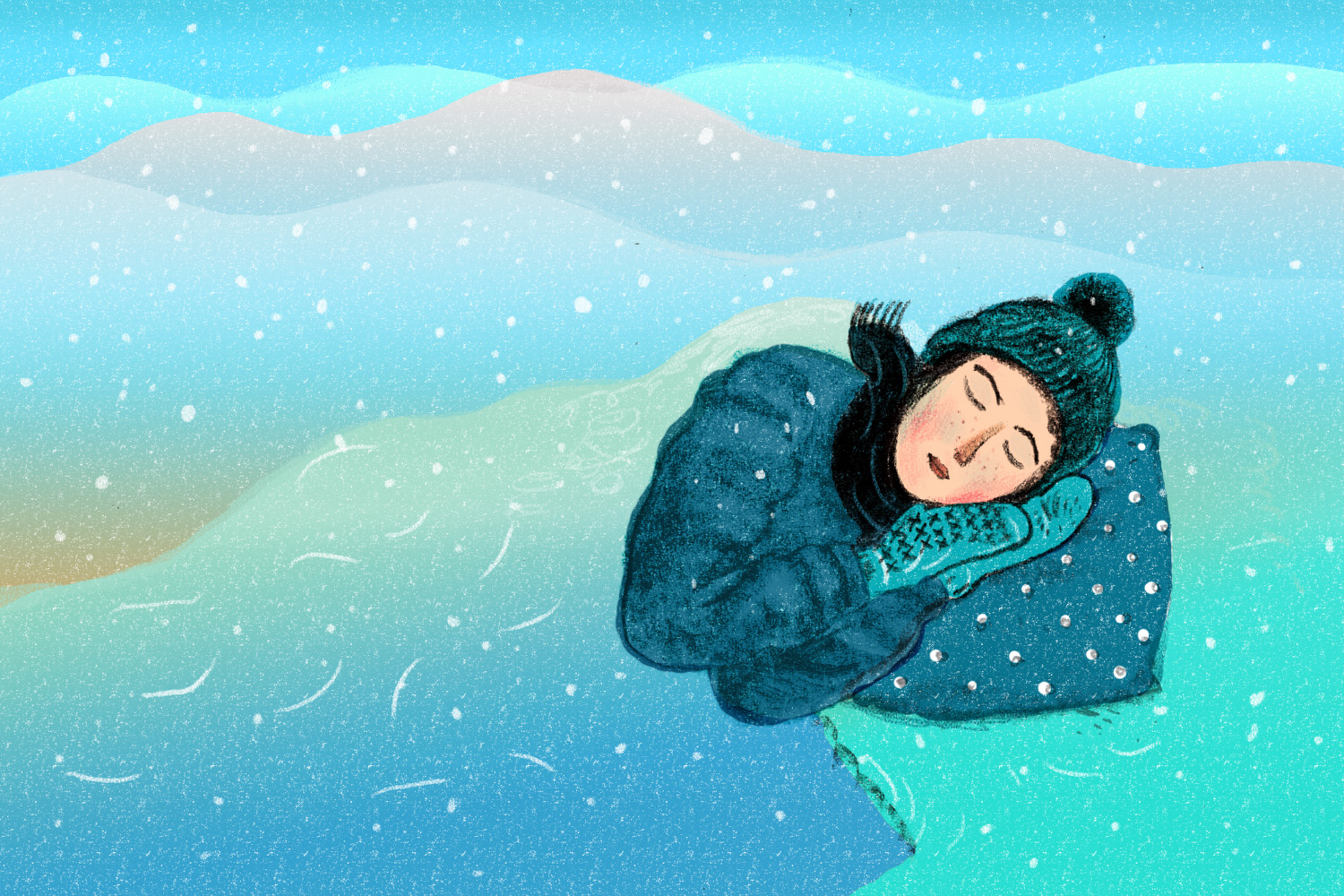
Ask any insomniac about the perils of a hot pillow: When you’re trying to sleep, your brain loves the cold. Wearing a cooling cap helped insomniacs snooze almost as well as people without sleep problems, found a study from the University of Pittsburgh School of Medicine, and there’s also some evidence that yawning helps your brain offload heat before bedtime.
In fact, there’s lots of evidence for the cooler camp. A drop in your core temperature triggers your body’s “let’s hit the sack” systems, shows research from the Center for Chronobiology in Switzerland (and a lot of other places.) Some new research from the National Institutes of Health also suggests that sleeping in a cool room could have some calorie-burning health benefits. Healthy men who spent a month sleeping in a cool (but not cold) 66-degree room increased their stores of metabolically active brown fat, says Dr. Francesco Celi, chair of Virginia Commonwealth University’s division of endocrinology and metabolism. “Brown fat” may not sound very desirable, but it actually helps your body burn calories and dispose of excess blood sugar, he explains.
“We found that even a small reduction in bedroom temperature affects metabolism,” Celi says.
You Asked: Your Top 10 Health Questions Answered










So if you want a healthy night’s sleep, crank down the thermostat, right? Unfortunately, it may not be that simple—when it comes to all of your below-the-neck parts, things aren’t so straightforward.
In Celi’s brown fat experiment, the men slept under thin sheets. What if you’re the type who likes a cozy down comforter? “Sorry, that won’t work,” Celi says, adding that some evidence points to shivering as the mechanism that brings on the increase in brown fat his team observed. His experiment didn’t keep tabs on sleep quality. So while the cold may be good for your metabolism and brown fat stores, you may be paying for those benefits with a night of fitful sleep.
That possibility is supported by research from Dr. Eus van Someren and colleagues at the Netherlands Institute for Neuroscience. While a dip in core temperature before bedtime flips on your brain and body’s “time for bed” switches and helps you fall asleep, Someren’s research shows that keeping your skin temperature “perfectly comfortable” is important when it comes to maintaining deep, restful slumber.
Your level of “perfect comfort” is quite individual. But if you’re cold enough to be shivering, you’re not sleeping deeply, Someren says. His research shows that older adults in particular may benefit from warmer skin temperatures during sleep. In fact, both his work and more research from France suggest skin temps in the range of 90 degrees (!) may be optimal.
If that sounds nuts to you, consider the fact that thin pajamas, plus a sheet and blanket, could crank up your skin temperature to that 90-degree range—even if your room of slumber is only 65 degrees, Someren says. On the other hand, if your bedroom is too chilly or your blankets aren’t thick enough, blood vessels in your skin can narrow, locking in heat and upping your core temperature to a point that your sleep is disturbed, he explains.
Add in a sleeping partner, and things get even more complex; while you may yearn for a heavy down comforter, your spouse might prefer a thin sheet. “Temperature regulation is a tricky thing,” Someren says.
That’s a lot of bedroom science, but here’s the bottom line: keeping your head nice and cool is conducive to good sleep. To achieve that, set your thermostat somewhere around 65 degrees, research suggests. And layer up until you feel the Sandman creep closer.
More Must-Reads From TIME
- The 100 Most Influential People of 2024
- Coco Gauff Is Playing for Herself Now
- Scenes From Pro-Palestinian Encampments Across U.S. Universities
- 6 Compliments That Land Every Time
- If You're Dating Right Now , You're Brave: Column
- The AI That Could Heal a Divided Internet
- Fallout Is a Brilliant Model for the Future of Video Game Adaptations
- Want Weekly Recs on What to Watch, Read, and More? Sign Up for Worth Your Time
Contact us at letters@time.com